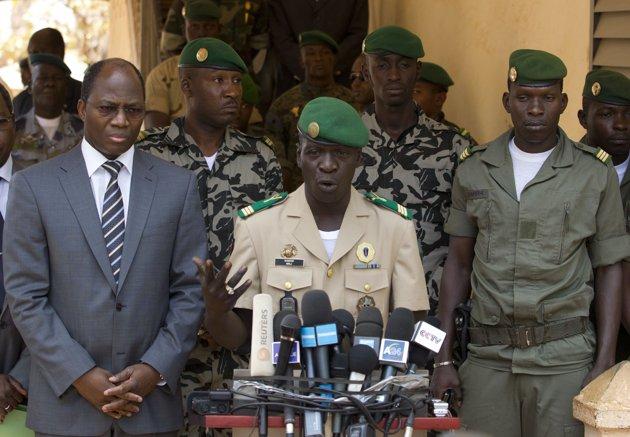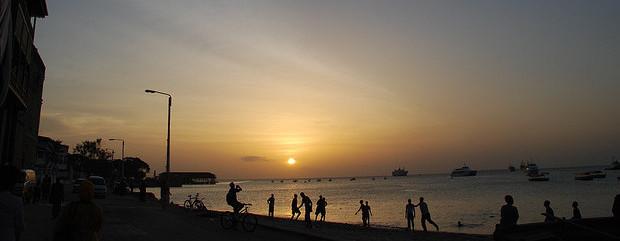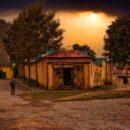Darfur: Recalling the Lessons of Abuja
The Abuja peace process turned into a calamity for Darfur. As yet another deadline for the Darfur peace process looms, it is timely to reflect on the reasons why the Darfur Peace Agreement of May 2006 didn’t succeed.
One reason for failure was that the substantive negotiations between the parties were made subordinate to another agenda, in this case the negotiations between Khartoum and Washington DC for the former to permit the transition from the AU to a UN peacekeeping force in Darfur. This created an artificial dynamic to the process, with both government and rebels spending more effort playing to the gallery than talking to one another, because they saw the gallery as the real power.
The DPA was justifiably criticized on the grounds of “no ownership, no peace.” Up against a deadline and frustrated by the lack of serious negotiations by either side, the AU mediation team in Abuja decided to draft its own mediator’s text, and present this to the parties with almost no opportunity for substantive revision. The mediators and the State Department lawyers had a greater sense of ownership over the text than the parties to the conflict. In fact, most of the details on security arrangements and wealth sharing had been agreed by government and rebels, but the central pillars of the power sharing chapter had not been, and this was sufficient to discredit the entire enterprise.
A third shortcoming was the failure to develop the proposals in full consultation with key stakeholders in Darfur. A number of Darfurian civil society delegations came to Abuja during the negotiations and presented their views, but there was no ground-truthing of the main planks of the proposals. On the security side, for example, the mediation team repeatedly proposed that there should be in-the-field discussions with commanders, but this was not done because of shortage of time. The weakness of the power-sharing proposals on local government and the failure of the wealth-sharing text to take account of nomadic migration routes, also reflected this shortcoming.
A fourth failure was the resort to pressure and incentives: the internationals became a party to the negotiations, not a mediator. On the final day of the Abuja talks, the international community, headed by the U.S., made a series of promises and threats. Deputy Secretary of State Robert Zoellick handed over letters from President George W. Bush to Minni Minawi and Abdel Wahid al Nur. But the rebels called the internationals’ bluff: the threats and promises remained on paper only. (Comparable promises and threats were made to Khartoum, but in private.) Insofar as the DPA was in reality an agreement between the Government of Sudan and the international community, it turned out to be worthless. It was an agreement parachuted from the sky, without roots.







Dear Alex
Brief and to the point. Lessons learned are important in our quest for a credible and durable resolution of Darfur Conflict.
Regrettably it is only observers and analysts who are aware of the importance of lessons learned. Neither Mediation nor the Friends of Darfur in the Doha Forum seem to make use of that.
In the absence of regaining the political initiative by both the Armed Movements and the External Stakeholders, the play field is left for GOS to dominate. GOS has become so daring that they want to engulf Doha and the International Community within their policy. Can not blame them.
In spite of the massive suffering of the Peoples of Darfur, one wonders if the Conflict is “ripe” enough for a solution. By that I mean if the genes for a negotiated settlement are there. Peace must be MADE and must be BUILT and that requires minimum conducive conditions. Do the Armed Movements have the ability to regain the political and military initiative without a major paradigm-shift in their vision? And when? Sharif Harir’s concept offers an example of “policy” thinking (doable or not is not the issue).
Possibly we all need to rethink an entry/re-entry point to the Process of Political Settlement based on the capacities and relative strengths of the belligerent parties and on what is feasible and doable to form the construct of a future agreement .
The humanitarian envelope of Darfur should not be the only driving force for structuring an agreement as the humanitarian conditions are a manifestation of the Root Causes of the conflict. Do we know what those really are?
Tag Elkhazin
Alex,
Your post raises an important question about whether or not these peace processes should be publicized. Some have argued that the peace process in Abuja was neglected by the international media while the emphasis on peacekeeping dominated the public narrative. At the same time, the idea that participants in the process were playing to the “gallery,” sounds like public exposure might be a detriment to progress. I’m curious about your thoughts on this issue. Should the progress of peace talks be available to the public before agreements are reached? Or does this cause too many problems with grandstanding and playing politics?
Yawn. No peace agreement will ever be acceptable to the rebels because they are deluded and bent on toppling Omar Al-Bashir. The rebels are terrorists and belong in jail. End of story.
Dear Ingrid
While I was tempted to respond to Ahmed Sadig’s intriguing question, I opted to give Alex first shot and I may follow. I will deal with the “process principles” if Alex does not cover them.
I am very moved by Ingrid’s short but very strong comment. I am moved as Ingrid expressed anger and hence concern and apathy with the peoples of Darfur.
In simple and clear words she is telling the Armed Movements to deal with “Darfur” and not with “Sudan”. If they deal with Darfur they are “Freedom Fighters”. If they deal with Sudan, they are an “opposition party”. I hope that I got you right. I cannot agree more. It is a crippling policy and an impediment to resolving the conflict if the Movements do not change course and deal only with the issues of their constituency.
The tragedy is that no one in the rest of Sudan really cares about what is going on in Darfur, especially the humanitarian manifestations of the Conflict.
I disagree that the Rebels are terrorists and do not agree that they belong in jail. There can be no resolution of the conflict without a negotiated settlement and for that, we need the rebel movements; then we can throw them in Jail!!
Stay well
Tag
The conflict in Darfur needs complete restructuring, even if it includes a new agreement. As dictatorial and conniving as Bashir’s regime may be portrayed, leadership of the rebels is on an equal footing with it. One of the “root causes”, a banal notion now, is the warring leadership of Darfur. Unless they put their voice in unison, they’ll remain at a disadvantageous position.
Furthermore, intrastate conflicts are trans-formative in nature, and to seek the root-causes will prove elusive. This is not to suggest focusing on addressing the consequences only. But in the absence of committed leaders and altruist regional/international mediation, I am afraid stepping outside the paradigm is what’s left.
Alternatively, that can include behind the scenes negotiations to stop the violence as a first step from which parties can proceed to addressing the conflict itself. But this needs to start between the rebels of Darfur themselves for it to be legitimate to get the ball rolling with the central regime. multi-headed rebellion/opposition is as detrimental as an acephalous one.
Jamila El-Gizuli
Dear Ahmed,
In a complex conflict (such as Darfur) it is probably inevitable and necessary that any mediation is conducted in the glare of publicity. Inevitable, insofar as there can be little secrecy where multiple stakeholders are involved. Necessary, insofar as groups will need to test out the proposals against their constituents. The problem with the Abuja process was that the public campaign was not for peace, or for specific proposals within the peace agreement, but for international (UN or NATO) troops. The campaign succeeded but it did not solve Darfur’s problems.
I don’t think there can be a general rule about whether peace processes are better conducted in secret or in public. It depends on the circumstances. But what is essential is that the two sides must build confidence, and generally this means that they must have the opportunity to meet in a confidential and secure setting, and discuss among themselves with minimum distraction.
Dear Tag,
I think you are right that people do not care so much about Darfur, and sympathy for the Darfur rebels has evaporated. For much of its life, the Save Darfur campaign did not criticize the rebels (especially not Abdel Wahid al Nur), but that benefit of the doubt given to the armed movements has not benefited the Darfurian people as a whole. At the time when the Abuja process failed, I feared that the Darfurians had missed their chance for the foreseeable future, and nothing subsequently has made me change my mind. The Government strategy of playing for time has worked, as with every passing month, the organized opposition is weaker, both internally and externally. Unfortunately, the weakness of the opposition does not reflect the depth of the grievances of the population, and so the gap between what is politically expeditious for the Government, and what is politically necessary for a long-term solution, grows wider.
Dear Jamila,
I agree that it is necessary to step outside the paradigm. A year ago, the AUPD call for an inclusive process that involves all Darfurians was one such attempt, which remains valid in principle, if difficult in practice (and increasingly difficult a year on). Darfurians need to think ahead to face the challenges of a post-referendum northern Sudan, and how they will be positioned in such a state.
Dear Tag,
Thank you very much for your well reasoned, thoughtful and considerate reply. Here below is my response in the form of an unusual request. Although I drafted it last evening, its opening line has been on my mind for several years. Yes, I agree with you, it is a tragedy that too many Sudanese people, rebels and former rebels included, do not really care about what is going in Darfur. My message to the armed movements is this:
The pen is mightier than the sword.
Agape,
Ingrid
AN OPEN LETTER OF REQUEST TO INTERNATIONAL LAW MAKERS AND THE INTERNATIONAL CRIMINAL COURT
Law abiding citizens, especially those in Africa, should be concerned that any armed civilian is free to use violence and seize political power without being democratically elected.
In the name of peace, I hereby propose and request the introduction of an international law banning, for life, any member of a civilian armed movement from serving in government.
Multi-media communications and social networking tools are now freely available for people anywhere in the world to air their grievances, showcase solutions and garner support.
If there is anything I can do at my blogs to help usher in such a law, please let me know. However, if such a law is not feasible I would appreciate any feedback on the reasons why.
Hopefully, a suitable law can be introduced speedily to discourage armed civilians from attempting to overthrow or destroy a democratically elected government by force and violence.
Thanks to Alex if he kindly decides to publish this request, submitted on Monday, 06 September 16:10 PM GMT UK.
Ingrid J. Jones (Miss)
Editor
Sudan Watch
http://sudanwatch.blogspot.com
England, U.K.
Dear Ingrid,
Provisions for discouraging the right to bear arms against the state can easily be interpreted as delegitimization. No democratic nation would allow for such a stipulation. How could Africans submit to this?
May I correct you in saying that Sudan is not a democracy? The elections were a sham. Sham elections notwithstanding, I believe it was Chirac who said “la democratie n’est pas faite pour l’Afrique” or “Democracy ain’t for Africa” (another reason we admire the French’s contempt for subtlety.)
The rebel leaders are as feckless and distasteful as the NCP regime. As critical as we are, there is no purpose in denying that the reasons for armed rebellion were justifiable enough to warrant that consequence. We must decouple the current (lack of) political efforts by the rebels from the incipient climate condition provoked by Khartoum. Darfuris demand it. non-NCP Sudanese concede to it.
Regards,
Jamaledin
Dear Ingrid,
The type of law that you describe would have to be created through convention and treaty, with the various nations having the ability to accept or reject the appllication of the law.
I can not speak for any other nation, but I live in the US, which has as its religion the right to bear arms and the sanctity of armed conflict. The nation was born out of armed conflict.
In fact, I live in a state [Virginia] where the last effort at gun control limited citizens to the purchase of only one handgun per calendar month. [That allows for the purchase of 12 guns a year; and this restriction does not apply to rifles.] And there is a currently an effort afoot in the legislature to have this restriction repealed.
I believe that your proposed law would help to improve the quality of life for people worldwide, but I have little faith that my countrymen would accept it for themselves, even though they would probably be more than willing to impose such a restriction on Africans.
Having said this, I believe that yours in an idea that should not be abandoned. Perhaps one day the rest of the world will catch up with you.